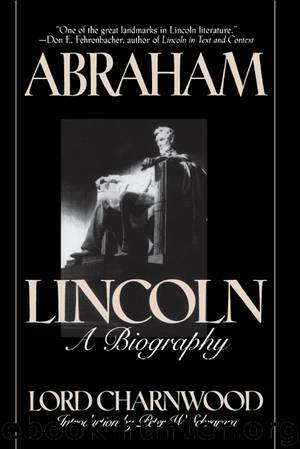Abraham Lincoln by Lord Charnwood

Author:Lord Charnwood
Language: eng
Format: epub
Publisher: Madison Books
Published: 1996-03-14T16:00:00+00:00
2. Bull Run.
Thus, in the autumn of 1861, North and South had become solidified into something like two countries. In the month of July, which now concerns us, this process was well on its way, but it is to be marked that the whole long tract of Kentucky still formed a neutral zone, which the Northern Government did not wish to harass, and which perhaps the South would have done well to let alone, while further west in Missouri the forces of the North were not even fully organised as in the East. So the only possible direction in which any great blow could be struck was the direction of Richmond, now the capital, and it might seem, therefore, the heart, of the Confederacy. The Confederate Congress was to meet there on July 20. The New York Tribune, which was edited by Mr. Horace Greeley, a vigorous writer whose omniscience was unabated by the variation of his own opinion, was the one journal of far-reaching influence in the North; and it only gave exaggerated point to a general feeling when it declared that the Confederate Congress must not meet. The Senators and Congressmen now in Washington were not quite so exacting, but they had come there unanimous in their readiness to vote taxes and support the war in every way, and they wanted to see something done; and they wanted it all the more because the three months’ service of the militia was running out. General Scott, still the chief military adviser of Government, was quite distinct in his preference for waiting and for perfecting the discipline and organisation of the volunteers, who had not yet even been formed into brigades. On the militia he set no value at all. For long he refused to countenance any but minor movements preparatory to a later advance. It is not quite certain, however, that Congress and public opinion were wrong in clamouring for action. The Southern troops were not much, if at all, more ready for use than the Northerners; and Jefferson Davis and his military adviser, Lee, desired time for their defensive preparations. It was perhaps too much to expect that the country after its great uprising should be content to give supplies and men without end while nothing apparently happened; and the spirit of the troops themselves might suffer more from inaction than from defeat. A further thought, while it made defeat seem more dangerous, made battle more tempting. There was fear that European Powers might recognise the Southern Confederacy and enter into relations with it. Whether they did so depended on whether they were confirmed in their growing suspicion that the North could not conquer the South. Balancing the military advice which was given them as to the risk against this political importunity, Lincoln and his Cabinet chose the risk, and Scott at length withdrew his opposition. Lincoln was possibly more sensitive to pressure than he afterwards became, more prone to treat himself as a person under the orders
Download
This site does not store any files on its server. We only index and link to content provided by other sites. Please contact the content providers to delete copyright contents if any and email us, we'll remove relevant links or contents immediately.
| U.K. Prime Ministers | U.S. Presidents |
Waking Up in Heaven: A True Story of Brokenness, Heaven, and Life Again by McVea Crystal & Tresniowski Alex(37003)
Empire of the Sikhs by Patwant Singh(22172)
We're Going to Need More Wine by Gabrielle Union(18072)
Hans Sturm: A Soldier's Odyssey on the Eastern Front by Gordon Williamson(16620)
Leonardo da Vinci by Walter Isaacson(11901)
The Radium Girls by Kate Moore(10907)
Educated by Tara Westover(7061)
Tools of Titans by Timothy Ferriss(6945)
How to Be a Bawse: A Guide to Conquering Life by Lilly Singh(6692)
The Last Black Unicorn by Tiffany Haddish(5075)
Permanent Record by Edward Snowden(4996)
The Rise and Fall of Senator Joe McCarthy by James Cross Giblin(4843)
Promise Me, Dad by Joe Biden(4446)
The Wind in My Hair by Masih Alinejad(4424)
The Crown by Robert Lacey(4105)
A Higher Loyalty: Truth, Lies, and Leadership by James Comey(4032)
The Iron Duke by The Iron Duke(3639)
Joan of Arc by Mary Gordon(3257)
How to be Champion: My Autobiography by Sarah Millican(3185)
